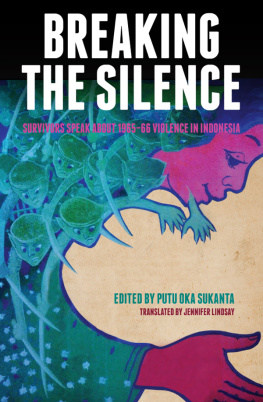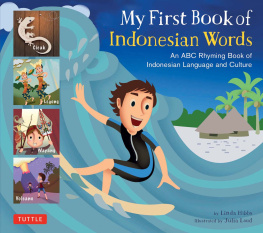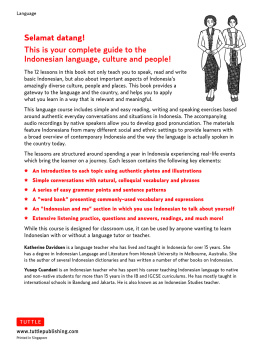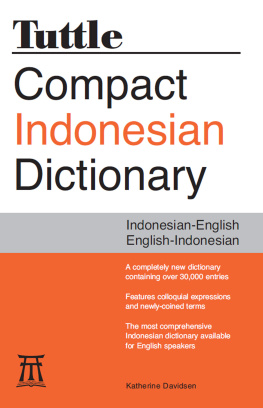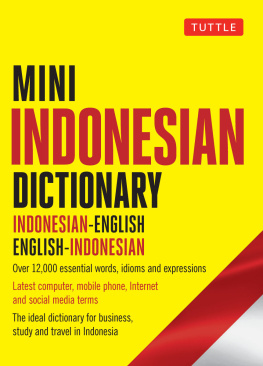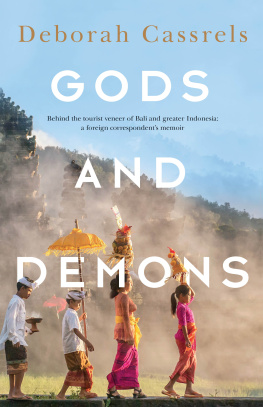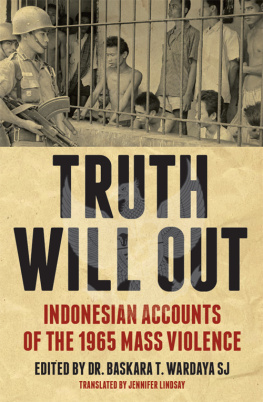BREAKING THE SILENCE
SURVIVORS SPEAK ABOUT 196566 VIOLENCE IN INDONESIA
EDITED BY PUTU OKA SUKANTA
TRANSLATED BY JENNIFER LINDSAY

About the Herb Feith Translation Series
The Herb Feith Translation Series publishes high-quality non-fiction manuscripts not yet available in English, which enhance scholarship and teaching about Indonesia. Published by the Herb Feith Foundation in conjunction with Monash University, the books are available open access or for free download.
The Herb Feith Foundation was established in 2003 to commemorate the life and work of Herb Feith (19302001), volunteer, scholar, teacher and peace activist. Its mission is to promote and support work of the kind to which Herb Feith devoted his life, including the study of Indonesia, through a range of educational activities including research and teaching and in the publication and promotion of such work.
Series Board
Professor Greg Barton
Assoc. Prof. Charles. A. Coppel
Dr Jemma Purdey
Dr Djin Siauw
Mr Pat Walsh OA
Translating accounts of the 196566 mass violence in Indonesia
Series co-ordinated by Dr Kate McGregor and Dr Jemma Purdey
Until recently there have been very few accounts available in Indonesian or English of the 196566 mass violence as told by witnesses, survivors or perpetrators. Today an increasing number of memoirs and short testimony collections are available in Indonesian, however, very few are yet available in English language. This has prevented a greater understanding outside Indonesia of how this violence continues to impact on Indonesians and of how they now understand this traumatic period of their nations history.
These translated works are valuable resources for all who seek to understand Indonesia today, and especially for undergraduate students of Asian history and the history of mass violence and genocide. This book is the second in this series of translated accounts of the 196566 mass violence in Indonesia.
Foreword
Like other sixth graders in primary school in Jakarta at the time, my class was taken on a study tour to Lubang Buaya an important site for the New Order. We crowded together to listen to the stories about the shallow well where the bodies of the generals were thrown, and with our limited imaginations we tried to make sense of the diorama that depicted the extermination of people who were said to have wanted to destroy our country. We were told about the heroism of Soeharto who rescued our nation. But because we were still children, we could not take in much of it other than fear, because indeed the whole idea was to make us frightened. I stared open-eyed at the relief depicting women dancing with their scarves while, as the story went, the generals were being tortured and then murdered. My teacher whispered. Move along now. Dont spend time here. These are bad women. We hurried on, turning back to take a peek.
It was only later in my teens that I began to understand the truth that had been hidden all this while. This truth was not taught in schools or universities, not broadcast on television, nor was it to be found in history books. This truth one had to search for oneself had to dig up from a snippet here, a snippet there. We heard vaguely about the blood that had flowed and the suffering of our fellow citizens. There before our eyes were the living witnesses who were still silent and silenced.
The Reformation era that began in 1998 opened up the opportunity for Indonesia to acknowledge the evils of the past and restore a social order based on truth and justice. But this has not been done, still to this day. In 2004, parliament passed a law to form a Truth Commission. But this law was weak and controversial. The law offered the victims reparations, but only in return for amnesty for the perpetrators. In the end, rather than fix it or strengthen it, in 2006 the Constitutional Court cancelled the Truth Commission. And so there was a vacuum, where the leaders did not dare to take firm steps to acknowledge their past wrongs, as though they were just glancing back. They did not care.
Telling the truth
This book is a compilation of stories from 15 people whose lives were forged by a holocaust in Indonesia. The word holocaust, which is used to refer to Nazi barbarity in exterminating the Jews, and meaning destruction or slaughter on a mass scale, is fitting to describe what happened in Indonesia in 196566. This book is written by a group of people senior and emerging writers who have been involved with 1965 issues for a long time or who are only now learning about what happened. The questions in their hearts were: what did it feel like to be in the midst of this wave of evil towards humanity? How could someone salvage their own humanitarian sense at a time when the entire value system that had been nurtured for centuries had been completely overturned for the interests of the power of the moment?
Fifteen people, representing all points of the compass, were engulfed by the political storm that completely changed their lives. The following short extracts show just how terrible the events were that attacked the lives of those who became victims:
Leo, the young artist from Yogya: A young artist in Yogyakarta, charged with youthful enthusiasm, joins an art group on campus with ideals for change. He is invited to the capital city to make posters and banners for Indonesian independence day. When he returns to Yogyakarta, the world is upside down. Two weeks later the police take him to a safe place. He does not realise that he will be held safely for 14 years. His experiences are amazing he is moved from cell to cell in Java, to Nusakambangan and finally to Buru island. Before he boards the ship taking him to Buru, Leo is given an identity number, 3041, written in ink on the pillow he has just been given, like all the other prisoners. The island of Buru becomes his home for the next ten years. While on Buru, the prisoners are visited by the Red Cross, and someone smuggles a letter to them, written in English. Because the letter is discovered, everyone is punished. After a visit by the Attorney General Ali Said, their lives improve a little. They are allowed to organise sports and arts events. They are given a television set, but are not allowed to hear the news. They can only watch the pictures without sound a silent drama that continues until today.
Benny, the policeman from West Timor: Even now, decades after his experiences, Benny is still disturbed by his memories. He finds it difficult to wipe the memories, difficult to leave them behind, the victims who had to die at the point of the gun he held. When he and his wife had difficulties having children, he was haunted by the thought that this might be Divine retribution. A generation later, Bennys children have to interpret their own inner worries: was my father a murderer? Was he also a victim? Or both? Should I have to bear the burden of the sins of my father?
Nadue, a teacher on the island of Sabu: It turns out that I am still someone, that there are still people who want to listen to this bitter history, who believe in me. She never imagined that her suffering on a small island in the remote southern islands of Indonesia was also that of thousands, even hundreds of thousands, of others. As a young teacher, Nadue wanted to serve her nation and was the only female who could teach algebra and English on the whole of the island of Sabu at that time. She joined the Indonesian womens movement, Gerwani, and her husband, who was also a teacher, joined the Communist Party because he thought it cared for the interests of the people. Nadue was arrested when she was heavily pregnant. It was also said she carried a bomb in her trousers, even though she never wore trousers. She was permitted to give birth at home, but immediately afterwards was taken back into prison. There she heard that her husband had been murdered. A soldier roughly cut her hair off short. Even today, a woman with short hair is often called Gerwani. After her imprisonment, Nadue eked out a life as a farmer. She was no longer permitted to teach even though she had contributed so much to the nation. And hundreds of schoolchildren on the island of Sabu missed out on the opportunity to study with her.

